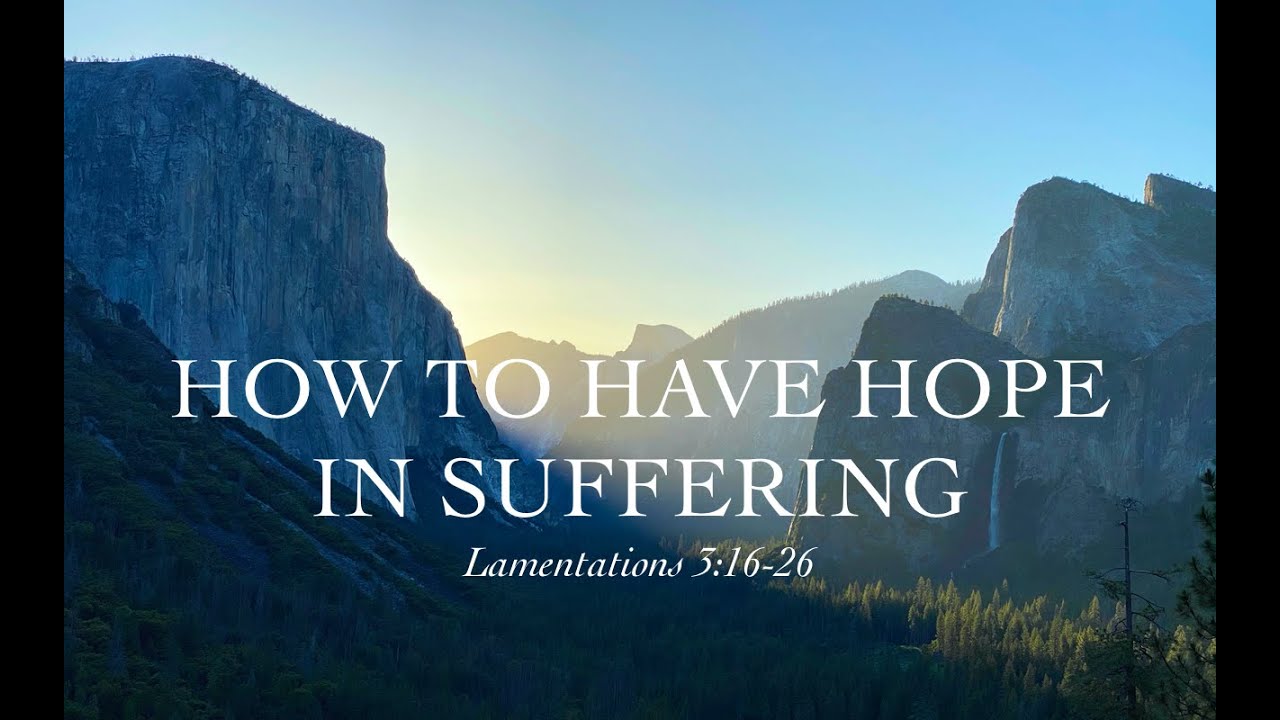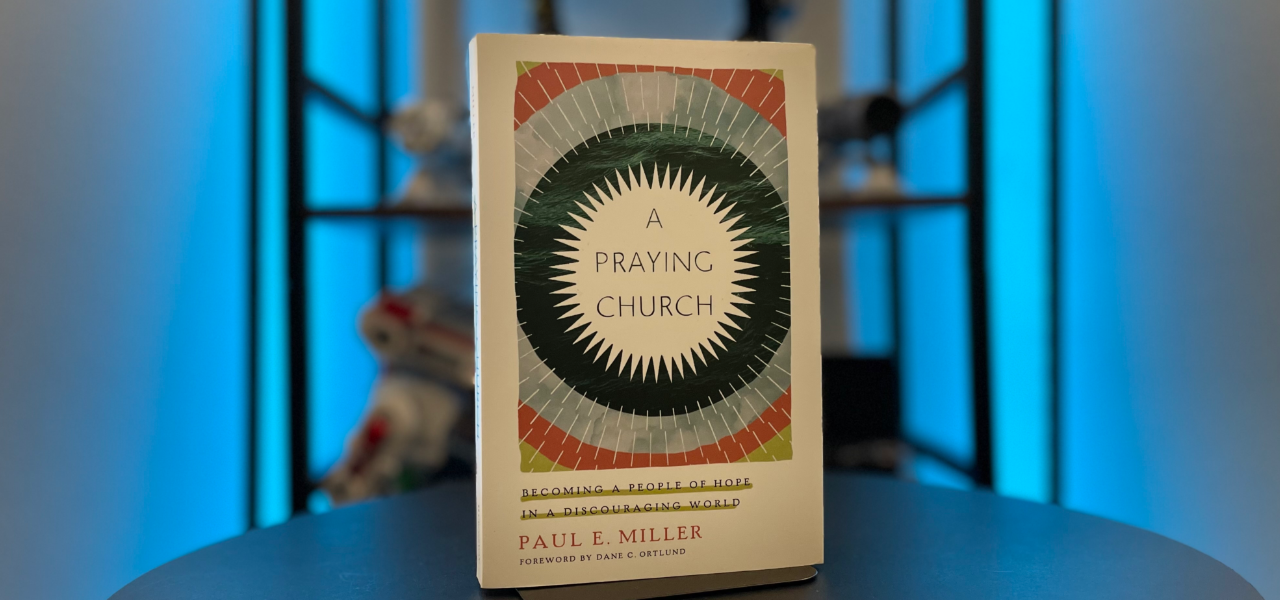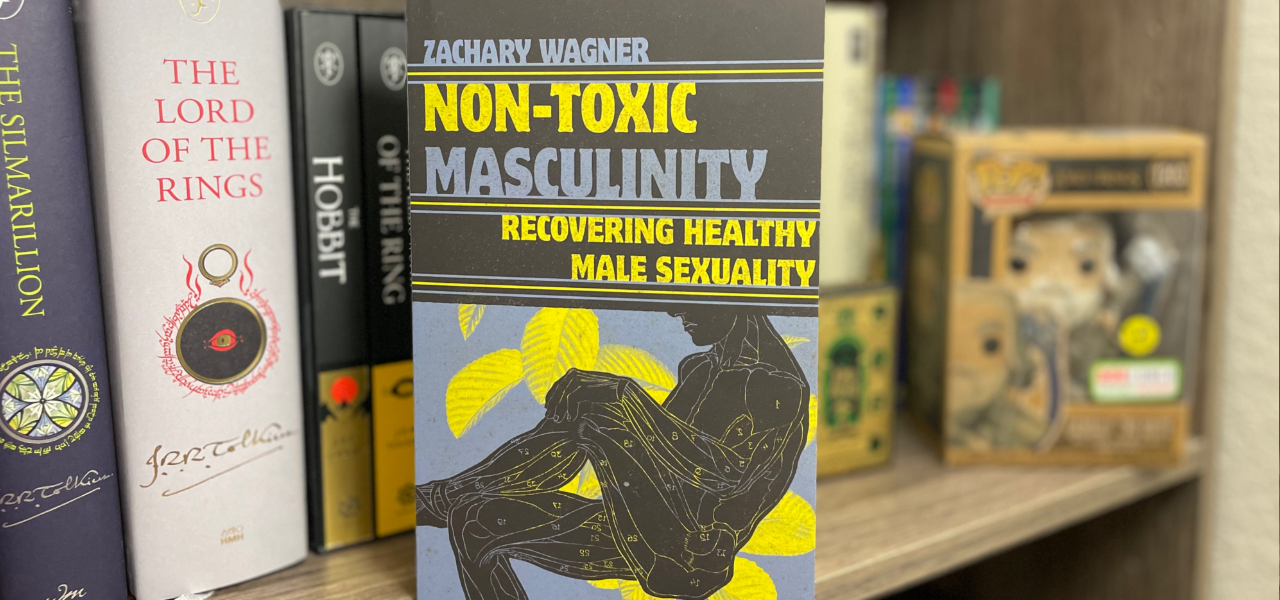How To Have Hope In Suffering

Below is a lightly edited transcript of this message.
Have you ever been confronted with something so awful you didn’t even want to think about it? A few years ago my family was in New Mexico for my mom’s wedding. She got married on a Saturday and the following Sunday I was going to be preaching for her church. We planned to begin driving back to Fresno after church on Sunday morning. So Saturday evening after the wedding I’m working on my sermon notes and Sarah is in our bedroom at our AirBNB packing everything up. As I was studying I wanted to get something to drink, so I get up from the kitchen table where I was studying and as I walk to the refrigerator I just so happened to look out the window at the front of the house and I just so happened to catch a glimpse of the top of my three-year-olds head passing out of sight in the window. So of course I instantly go running outside and find my three-year-old running down the sidewalk in this random, shady, Albuquerque neighborhood with a big old smile on his face. He was taking off and not looking back.
Of course, I am running and not smiling, chasing after him, yelling his name in a panic. I got him and he was fine. I got back inside and told Sarah what happened. He was having a good old time while Sarah and I just lost a few years off of our lives. The next morning while we were driving to church my mind was still racing and I can remember asking Sarah, “What would have happened had I gotten up a second later? I would not have seen him.” And Sarah stopped me and said, “I can’t, I don’t even want to think about it.” Have you ever been confronted with something so awful you didn’t even want to think about it?
I have found that is how a lot of people view suffering. They don’t even want to think about it. Almost as if not thinking about it will guarantee it doesn’t happen. Sometimes even when a person is in the middle of a difficult season there is a refusal to acknowledge it. But when we refuse to engage with the reality of suffering we miss out on what God wants to do in us through our suffering. We also miss out on how God engages us with his love in our suffering. The theme we are going to see emerge from our text is: God’s love enables us to persevere through suffering.
The book of Lamentations was written by the prophet Jeremiah while Jerusalem was being invaded by the Babylonian army in 586 BC. During this invasion, they completely sacked the city, and every outward and visible symbol of God’s presence with Judah was reduced to rubble. Lamentations is a really small book made up of 5 chapters. Each chapter is a poem of lament. But right in the middle of this rather depressing book of the Bible, we are given one of the most well-known passages of God’s love. So this morning we are going to see how this 2,600-year-old poem of lament helps us navigate what we are facing today.
One of the things I love about scripture is that it never avoids the reality of pain and suffering. While sometimes we try to avoid it, God never does and as we read about other people walking through difficulties we get a glimpse of how we can walk through them as well. This leads us to our first point which is…
The Reality Of The Situation
As Jeremiah is taking in the literal destruction of his home and the city he loves becomes incredibly depressed. This is arguably the lowest point in Judah’s history up to this point.
He says he feels like…
His teeth have been ground with gravel
He has has been deprived of peace
He has forgotten what prosperity was
He thought he had no future and lost even all hope in God
If you read this small little book its just lament after lament after lament. What we learn from this is there is a place for grieving. There is a place for realizing how bad a situation is and letting yourself feel it. There is nothing spiritual about denying the reality of a bad situation. We see this especially in many of the Psalms. But Psalm 88 is especially painful because the entire Psalm is painful. There is no hope or resolution. It just ends with despair.
Psalm 88:18 You have distanced loved one and neighbor from me; darkness is my only friend.
I struggle with this because I don’t want to feel pain. I would rather just deny it and pretend like I’m okay when I’m not. But I had a counselor tell me one time “You cannot heal from what you will not feel.”
If we just deny the reality of our situation we will miss out on everything God wants to do in that situation and we will miss out on the healing that God wants to give us from that situation. I know many of us are hurting right now. On Tuesday I got messages from three different people who had lost loved ones. It’s okay to feel that loss. It’s good to feel that loss and take it to God. Many people are hurting right now because of the various effects of COVD. Maybe you are out of work. Perhaps you have a loved one who is sick. Or even you are worried about what all this means for the future. It’s okay to feel what you are going through. There is nothing spiritual about pretending like you have it all together when you don’t.
Maybe you’re listening in this morning and you are feeling the pain caused by someone else’s sin. And you hurt because you are watching someone you love tear apart their lives because of sinful decisions. Maybe you are wrestling through the results of your own sinful decisions. And you are hurting. It is okay to just hurt. It is okay to look at the reality of where your life is at and mourn what you have lost. Don’t deny the reality of the situation, but take that brutal reality to God. Ask God the hard questions. God’s shoulders are big enough for your hard questions.
In verse 18 Jeremiah says his future is lost. Jeremiah is in such a bad place he says “I’m done.” He says he has no more hope from God. Now I know that seems bad like we shouldn’t say that, but remember the Holy Spirit inspired this to become a part of Scripture. God can handle you being brutally honest with how you are feeling. We don’t have to keep up a facade with Jesus, we can tell him exactly where we are at.
In verse 19 he says he is remembering his affliction and his literal homelessness. And as he thinks about it leads him deeper into depression but then in verse 21 Jeremiah makes a decision. You see when things go bad it’s absolutely appropriate and even healthy to mourn and lament for what is lost. However…as Christians, there should be a key distinction in our grieving. Even though our difficulties make us feel hopeless, we are never truly without hope. The reason we want to acknowledge our feelings, the reason we want to be real about what we are going through is so that we can invite God into that space and let him work. Look at what Jeremiah says in verse 21.
Lamentations 3:21 Yet I call this to mind, and therefore I have hope:
This leads us to our second thought. Not only do we see the reality of the situation, but we also see…
The Decision To Switch Focus
Jeremiah has a lot on his mind. Everything around him is falling apart but he realizes he has to change his focus. Now he almost seems contradictory. In verse 18 he says he has no hope but in verse 21 he says he does have hope. Here is the truth – you can be real about the reality of the pain that you are feeling AND make the decision to put your eyes on the reality of God’s love for you. After we have taken the time to assess the brokenness, if we genuinely want to experience his healing we have to decide to switch our focus. It is not disingenuous to FEEL like you have no hope, but by faith put your hope in God.
It is not inauthentic to wrestle with the reality of your hardship while also acknowledging the reality of God’s faithfulness. Jeremiah is saying “Even though I am broken, afflicted, forced to walk in darkness, I have no peace; even though I feel like God has filled me with bitterness and ground my teeth with gravel and it looks like I have no future, I call this to mind! I will think of a better truth, a bigger truth, and an eternal truth. This truth gives me hope when I have no hope and t keeps me going when I am at my end.
Colossians 3:1-2 So if you have been raised with Christ, seek the things above, where Christ is, seated at the right hand of God. Set your minds on things above, not on earthly things.
When we decide to switch our focus we get to experience God’s love which enables us to persevere through the reality of our suffering.
Which leads us to our third thought.
The Truth Of God’s Love
The Hebrew word for love in verse 22 is Hesed. It refers to God’s covenantal love. It’s a love that is not conditional. In Christ, the steadfast love of God for you will never cease. Never!
GOD’S LOVE SUSTAINS US
Despair never has the last word when our hope is in God! I know there are days when we feel like it’s all over. But it’s not. How do we know that? Because God loves us! No matter what we face we will be okay because God loves us. This is why Jeremiah could look around and see all the hopeless devastation that was ripping his home apart and still have hope. Because he focused on God’s sustaining love.
You know one of the amazing things about being a parent is to me? It doesn’t matter how bad of a day you can have, when you walk into your home and your little kids come running up to you screaming “Daddy! Mommy!” and they give you a big hug, all your troubles seem to melt away. It’s the coolest thing. Now imagine the God of the universe reaching down and wrapping his all-powerful arms around you saying “MY CHILD! I love you! I got you!”
Romans 8:35-39 Who can separate us from the love of Christ? Can affliction or distress or persecution or famine or nakedness or danger or sword? … No, in all these things we are more than conquerors through him who loved us. For I am persuaded that neither death nor life, nor angels nor rulers, nor things present nor things to come, nor powers, nor height nor depth, nor any other created thing will be able to separate us from the love of God that is in Christ Jesus our Lord.
Not only does God’s love sustain us. Look at what else gives Jeremiah hope in his suffering.
GOD’S MERCY MEETS US EVERY MORNING
Charles Spurgeon said “If every day brings its trouble, every day also brings its mercy. No one can say that so true as the person who has known God’s great faithfulness in great affliction.” Our world has seen its fair share of bad days. Countless wars, drought, famine, economic collapse, disease, tyranny. But you know what’s amazing? Even after the worst days and the most terror-filled nights, the sun still rises every day. It’s as if God built into creation this daily reminder that no matter what happens he is faithful. Every day when that sun comes up God washes you with brand new mercies for today. Jesus said in Matthew 6:34 “Therefore don’t worry about tomorrow, because tomorrow will worry about itself. Each day has enough trouble of its own.” And just like each day has enough trouble, God guarantees we will have the mercies we need to face them. But we often tend to despair when we think that we may have to bear tomorrow’s load on today’s resources. God wants us to know: We won’t. Today’s mercies are for today’s troubles. Tomorrow’s mercies are for tomorrow’s troubles. Don’t waste today’s mercies on yesterday’s mistakes or tomorrow’s problems. Jeremiah could persevere through the horrendous suffering he was facing because of God’s faithful love and mercy.
So we have seen that as believers we don’t have to deny the reality of our suffering because God meets us in it. We have also seen how Jeremiah shifted his focus from his suffering to his Savior and the BIGGER truth of God’s love. Now, in conclusion, let’s look at…
The Action Of Faith
In verses 24, 25, and 26 we are going to get out three takeaways from this passage.
TAKEAWAY #1 – PUT YOUR HOPE IN GOD
With his mouth full of gravel and made life full of bitterness, overwhelmed with sorrow, Jeremiah says, “The Lord is my portion.” Whatever else we have lost, we have not lost our God. Because God is your all you can lose everything and really have lost nothing because you still have God! Now notice the beginning of verse 24. Jeremiah is talking to himself. It says I SAY, “The Lord is my portion, therefore I will put my hope in him.” Jeremiah is reminding himself that God is all he needs and this enables him to do our first takeaway – Put your hope in God.
Hope often gets used as a word to describe our desire for an uncertain outcome. But biblically the word hope is a strong word used to express certainty in God’s future provision based on his truth and faithfulness. So when we, by faith, put our hope in God we are allowing the truth of his promises to be the truths that we cling to.
Takeaway #1 – Decide to put your hope in God.
TAKEAWAY #2 – SEEK GOD IN YOUR SUFFERING
Lamentations 3:25
The Lord is good to those who wait for him, to the person who seeks him.
When you are hurting take that hurt to God. Ask God the hard questions. Take your lament and your sorrow and give it all to him. God wants you to!
1 Peter 5:7 casting all your cares on him, because he cares about you.
Seeking God means seeking his presence. It means to set my mind and my heart on him. It is a conscious choice to direct my heart towards God. It is a conscious effort on our part. That effort to seek God is a gift from God. John Piper said “ God calls us to enjoy continual consciousness of his supreme greatness and beauty and worth. ”
Seeking God is the faith-filled, mental effort to be aware of God’s love and his goodness and his mercy towards me even when I am hurting. Even though it is out of the depths of the uttermost distress that we seek God, we will find him to be good to us.
TAKEAWAY #3 – QUIETLY WAIT FOR GOD TO WORK
Lamentations 3:26 It is good to wait quietly for salvation from the Lord.
Waiting is hard, isn’t it? I know I have said countless times, I can’t wait for everything to be back to normal. I don’t think I’ve ever said, “I’m okay with waiting for whatever God wants to do.” God’s time is always the best. To deliver us right now might be to deprive us of the benefit of the suffering. God calls us to quietly wait until the suffering produces “the peaceful fruit of righteousness.” Don’t shortchange what God is trying to do in your heart because, as Jeremiah reminds us, it’s good to wait quietly.
Takeaway #1 – Decide to put your hope in God.
Takeaway #2 – Seek God in your suffering.
Takeaway #3 – Quietly wait for God to work.




